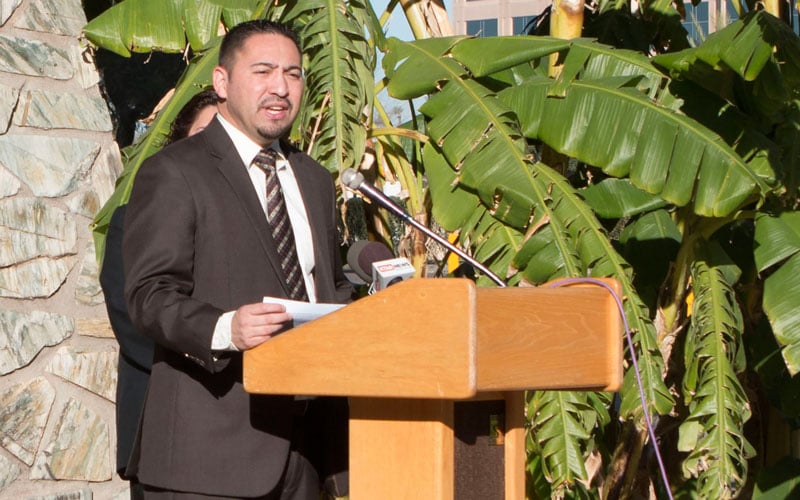
Sen. Martín Quezada holds a press conference in the Arizona State Capitol Rose Garden on Monday to gather support for Senate Bill 1019. (Photo by Gabrielle Abbott/Cronkite News)
A bill that would eliminate Arizona’s ban on school districts including any discussion of homosexual sex in teaching the prevention of sexually transmitted diseases is running out of time, according to the bill’s author.
Sen. Martín Quezada, D-Phoenix, and supporters of Senate Bill 1019 gathered on Monday in the Arizona State Capitol Rose Garden for a news conference in hopes of gaining momentum for the bill that would override a decades-old law entitled “Instruction on acquired immune deficiency syndrome; department assistance.” The law states “no district shall include in its course of study instruction which 1. Promotes a homosexual life-style. 2. Portrays homosexuality as a positive alternative life-style. 3. Suggests that some methods of sex are safe methods of homosexual sex.”
Arizona is one of eight states with these types of laws, according to the Gay, Lesbian & Straight Education Network.
Quezada said school board colleagues informed him of concerns regarding their sexual education curriculums. As they tried to update the lessons, they were warned by a lawyer that a law would prohibit them from including certain aspects, Quezada said.
He said this inspired him to look at the current laws.
“If you actually read the words it says, it’s pretty offensive,” Quezada said of the current restrictions in place.
If enacted, SB 1019 would eliminate this statute, which Quezada said would be beneficial to all students, not just LGBT students. Past efforts to remove the language, such as the proposal of Senate Bill 1457 in 2011, have not progressed.
“It doesn’t matter if you’re heterosexual or homosexual, you’re all students who we care about, who we want to protect, and we want to ensure you have the right information,” Quezada said.
Planned Parenthood Arizona CEO Bryan Howard said Planned Parenthood stands behind the bill because it encourages “comprehensive, medically accurate sexual education.”
Howard added that current sexual education curriculums are hiding a group of people, and that if inclusion is embraced, students will better understand themselves and their peers.
“All of that would reduce the isolation, reduce the shame, reduce the stigma,” Howard said.
Stephanie Luigs, a student at Arizona State University, voiced her support for the bill at the conference because she said it is crucial in protecting the health of students, and educating them about possible risks.
Luigs, who often is involved with HIV activism on ASU’s campus, said the lack of attention in sexual education courses teaching sexually transmitted infection prevention is “disturbing.”
“It shows that we aren’t valuing our students’ health enough to tell them what they need to know and I think that students would by all means want to know their options, want to know what it means to be in a healthy relationship and what it means to have a healthy sex life,” Stephanie said of Arizona’s current limitations.
Sen. Sylvia Allen, R-Snowflake, would need to put SB 1019 on the Thursday’s agenda, in order for it to move any further.
“If we can put it on the agenda, I think we can get it passed, we can get it moving,” Quezada said.
Allen’s office said she was unavailable for an interview on Monday.
Howard said he thinks the public overwhelmingly supports more inclusive education.
“There is no controversy about this among Arizonans,” Howard said. Planned Parenthood claims that 83 percent of the 700 Arizona households polled in January said they “believe the legislature has no business passing legislation that shames LGBT people.”
But, conservative lawmakers oppose the change, Quezada said.
“The biggest roadblock right now is that we’ve got a bunch of legislators here that don’t reflect the values of the people in the state of Arizona,” Quezada said.
Quezada encouraged the crowd at the conference to reach out to Allen and voice support for the bill. He said it’s time for laws to reflect the population.
“We’ve gotten to a point in our society, and a time in our society, where we should move beyond the stigmatization of one community over another because they are LGBT,” Quezada said. “It’s just not where we are anymore.”